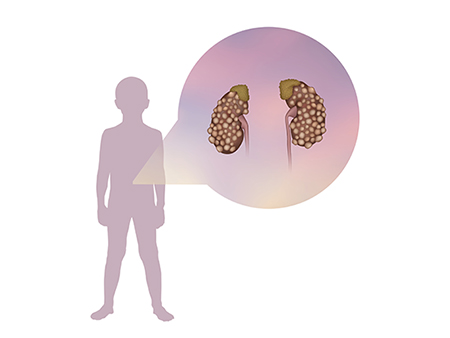 UAB’s new cystic kidney disease core center will spearhead a multidisciplinary approach to finding treatments for this devastating diseaseThe University of Alabama at Birmingham, in collaboration with Children’s National Hospital in Washington, D.C., has received a five-year, $4 million grant from the National Institute of Diabetes and Digestive and Kidney Diseases, part of the National Institutes of Health, to create a core center for childhood cystic kidney disease. The UAB-CCKDCC will conduct and facilitate research into the causes of and possible treatments for cystic kidney diseases, particularly those that present in childhood.
UAB’s new cystic kidney disease core center will spearhead a multidisciplinary approach to finding treatments for this devastating diseaseThe University of Alabama at Birmingham, in collaboration with Children’s National Hospital in Washington, D.C., has received a five-year, $4 million grant from the National Institute of Diabetes and Digestive and Kidney Diseases, part of the National Institutes of Health, to create a core center for childhood cystic kidney disease. The UAB-CCKDCC will conduct and facilitate research into the causes of and possible treatments for cystic kidney diseases, particularly those that present in childhood.
Polycystic kidney disease is a genetic disorder characterized by the growth of numerous cysts filled with fluid in the kidneys. PKD cysts can reduce kidney function, leading to kidney failure. People with PKD can also have cysts in the liver and problems in other organs, such as the heart and blood vessels in the brain.
The UAB/Children’s National grant is a U54 center grant, an NIH funding mechanism to develop a multidisciplinary attack on a specific disease entity or biomedical problem area. With this grant, UAB joins with investigators at the University of Kansas and the University of Maryland-Baltimore as part of the NIH Polycystic Kidney Disease Research Resource Consortium. The NIH describes the consortium as a framework for effective collaboration to develop and share research resources, core services and expertise to support innovation in research related to polycystic kidney disease.
“The intent is to accelerate the science and advance research into new therapies for cystic kidney disease through enhanced sharing of resources and the establishment of a robust research community,” said Bradley K. Yoder, Ph.D., professor and chair of the UAB Department of Cell, Developmental and Integrative Biology and co-director of the UAB-CCKDCC. “Childhood polycystic disease can be a devastating condition for children and their families.”
There are two inherited forms of PKD. Autosomal dominant PKD, often called adult polycystic kidney disease, usually sees symptoms develop around age 50. Autosomal recessive PKD is more rare and usually develops in utero or in early childhood.
 Bradley K. Yoder, Ph.D.“Infants with childhood cystic kidney disease may develop kidney failure within a few years after birth and some need dialysis and kidney transplantation before they reach adulthood,” said Lisa Guay-Woodford, M.D., director of the Clinical and Translational Science Institute at Children’s National and co-director of the UAB-CCKDCC. “In many cases, the earlier the onset of symptoms, the more severe the outcome.”
Bradley K. Yoder, Ph.D.“Infants with childhood cystic kidney disease may develop kidney failure within a few years after birth and some need dialysis and kidney transplantation before they reach adulthood,” said Lisa Guay-Woodford, M.D., director of the Clinical and Translational Science Institute at Children’s National and co-director of the UAB-CCKDCC. “In many cases, the earlier the onset of symptoms, the more severe the outcome.”
The UAB-CCKDCC will focus primarily on childhood cystic kidney disease. The center’s primary goals are:
- Provide the Polycystic Kidney Disease Research Resource Consortium members with access to phenotypic, genetic and clinical information and biomaterials from CCKD patients
- Analyze pathways involved in cyst pathogenesis through the generation of verified genetic model systems and biosensor/reporter systems
- Assess the impact of patient variants on cystic disease proteins through generation and validation of innovative models
- Provide ready access to biological materials from genetic CCKD models
- Develop efficient pipelines for in vitro and in vivo preclinical testing of therapeutic compounds
Overall, PKD is the fourth leading cause of kidney failure and affects approximately 600,000 people in the United States, according to the National Kidney Foundation. About 50 percent of people with the autosomal dominant form of PKD progress to kidney failure by age 60, and about 60 percent will have kidney failure by age 70. It affects about one in 500 adults. Childhood PKD affects about one in 20,000 infants.
At UAB, Yoder is the UAHSF Endowed chair in Biomedical Research. The consortium is funded by NIH grant number U54DK126087.